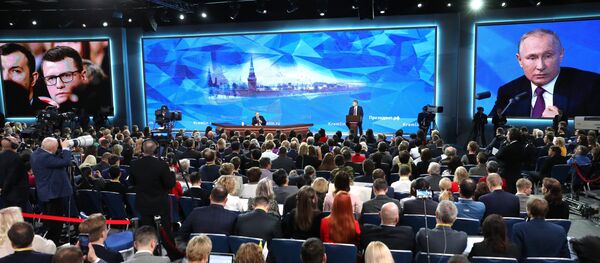The Initiative's overseas clusters are networks of politicians, businesspeople, military officials, academics and journalists who "understand the threat posed to Western nations" by Russian "disinformation", and work in support of the "Anglo-Saxon worldview", and a "tougher stance" towards the Russian state.
Its German operation is no different — in fact, its target membership is among the most influential and sizeable of any cluster I've yet come across, perhaps a reflection of the vital significance of Germany to the Initiative's objectives, and the vast scale of the organization's plans for the country.
'Full Engagement'
Its chief, political scientist Hannes Adomeit — who on January 4 menaced me with promises of "criminal charges" — produced an ‘interim report' on the cluster on October 3 2018.
In his opening remarks, Adomeit commits to "full engagement" with the Initiative, having been hitherto obliged to withhold his full, undivided attention from the organization in order to meet "prior commitments" connected to his role as Senior Research Fellow at the Institute for Security Policy at Kiel University (IPSK).
This primarily concerned a paper — Nach dem Helsinki Gipfel: Trübe Aussichten für eine Verbesserung der russischamerikanischen Beziehungen (After the Helsinki Summit: Dim Prospects for an Improvement of Russian-American Relations) — published under the auspices of the ISPK. Adomeit goes on to note "affiliation to ISPK and access to the journal is important" — as remarks elsewhere make clear, he intends to write and commission articles for the resource moving forward, so he continues to be involved with both "without taking on significant new commitments" for either.
A review of the 'paper' reveals the work to be far from academic in tone or content — it's pure polemic, with a perhaps predictably extremely negative stance towards Russia. Adomeit strongly condemns the country's "intransigence" while bemoaning the "absence of a coherent Washington approach to Moscow", and in conclusion fulminates that Trump missed a golden opportunity to "reject the Kremlin's narrative", "address [Russia's] malicious behavior", and try to secure "fundamental change in Russian politics".
"The effectiveness of this could have been enhanced if he'd sought strong European backing at the NATO summit in Brussels…[instead] Trump has further devalued the transatlantic relationship…he placates Putin's Russia. American policy [must] set boundaries for Russia…it's not clear the Kremlin wants improved relations with Washington," he writes.
Cluster Meetings
As of October 3 2018, the only confirmed members of the Initiative's German cluster 2018 are Harold Elletson — a long-time MI6 operative, who conducted espionage operations in the former Soviet Union — and Joachim Krause, Adomeit's "close friend" and former Stiftung Wissenschaft und Politik (Institute for International and Security Affairs) colleague, currently Director of the Institute for Security Policy at the University of Kiel.
Krause is chief editor of Germany's "only journal on strategies studies" — Zeitschrift fur Strategische Analysen, where Adomeit's Helsinki summit attack appeared — and the cluster chief stresses the "importance of this connection", as articles will appear in the periodical expressly "for the benefit of the Initiative".
At time of writing though, Adomeit had met with three others, scheduled rendezvous with three more, and intended to secure meetings with 12 further prospective members "after London and Vilnius" (it's unclear when these trips occurred).
The three individuals Adomeit met prior to authoring the document were Marieluise Beck (German Green MP 1994 — 2017 and founder of think tank Zentrum Liberale Moderne), Claudia von Salzen (journalist at Der Tagesspiegel), and Susanne Spahn (academic). Each was provided of an outline of "what the Initiative is all about" and "what [their] role in it might conceivably be".
Despite the Initiative's handbook indicating cluster members are compelled to sign non-disclosure agreements, I reached out to the trio, asking whether they joined and if so, what their responsibilities within it will be — as of January 8, Beck and Spahn haven't responded, while von Salzen replied in the negative.
Nonetheless, it's abundantly clear why she was a person of interest for Adomeit — her journalistic output output is rife with articles highly critical of Russia, which directly and indirectly advocate a harsh government line on Moscow not merely in Germany but throughout Europe. One article published November 26 2018 — Europe must set clear boundaries for the Kremlin — even has direct echoes of Adomeit's writing on the Helsinki summit.
Had von Salzen become part of the German cluster, the Initiative would've secured an intimate relationship with a prominent journalist writing for Berlin's "most serious and biggest daily newspaper" — which boasts a daily circulation of 148,000 — through which the organization could "pass on information by way of research papers, articles, presentations, individual conversations and personal contacts", without Initiative input being publicly disclosed.
Moreover, as the activities of the Initiative's Spanish cluster make clear, cluster members have been mobilized to influence government policy in concerted operations — and an individual with a significant national media platform and sizeable social media following could be particularly influential in this regard.
A review of the professional and political history of Beck likewise amply demonstrates why she made such an attractive candidate for cluster recruitment. While in the Bundestag she was a consistent and voluble critic of Vladimir Putin and modern Russia, and via Zentrum Liberale Moderne (LibMod) she's continued her crusade. The organization convened its first event in March 2018, The Putin System and the Kremlin's Influence in Europe, at which participants apparently agreed Russia was an "authoritarian kleptocracy" attempting to destroy liberal democracy in Europe, and influencing and manipulating the continent with ease due to "Western weakness" — all points of view resonating closely with the Initiative's own.
Intriguingly, as an MP Beck was an outspoken supporter of controversial US financier Bill Browder — named as being part of the Initiative's UK cluster. Browder has long-claimed the Moscow wing of his firm Hermitage Capital Management was stolen by Russian authorities in service of a vast tax fraud and his lawyer Sergei Magnitsky was jailed for trying to expose the crime, where he later died.
However, when documentarian Andrei Nekrasov, himself a long-time Putin critic, presented Beck with strong evidence to suggest Browder was himself in fact behind the fraud, and Magnitsky — in reality an accountant — had potentially facilitated it, she was left lost for words. Nekrasov subsequently made a film about the affair — The Magnitsky Act Behind the Scenes — and Beck played a significant role in the cancellation of its scheduled April 2016 premiere at the European parliament, and subsequent shelving of its broadcast on French and German TV.
How High?
Of the 15 remaining cluster candidates Adomeit had scheduled meetings with or intended to in future, it's likewise unclear who was receptive to his advances, as few have deigned to respond to my enquiries. Alice Bota, Editor of Der Zeit, said nobody had asked her to join, she was "not involved in any initiative", and had "no intention to do so in the future". Stefan Meister, of the German Council on Foreign Relations, said Adomeit "only wrote" to him about the Initiative, and he wasn't interested as there "[wasn't] enough information on the project [and] partners".
Still, again it's clear why Adomeit was interested in Meister — as the Council's Head of the Robert Bosch Center for Central and Eastern Europe, Russia and Central Asia, he contributed to a virulently anti-Russian November 2016 report published by the NATO-funded Atlantic Council, The Kremlin's Trojan Horses.
The document claimed a number of individuals the world over — including former German Chancellor Gerhard Schroeder — are used by Russia to "destabilize European politics", in exactly same manner as German cluster coordinator and MI6 operative Harold Elletson's ‘report' on Russian information warfare in Germany claimed ‘Russlandvesteher' (including Schroeder) had been "cultivated" to propagandize for Kremlin interests, with similarly absent supporting evidence.
However, perhaps the most high-profile names included in the document are Barbara and Arndt Freytag-Loringhofen — Barbara previously worked for the German government's coordinator for Russia policy, Andreas Schockenhoff, and her husband is NATO's first Assistant Secretary General for Intelligence and Security, having previously been Germany's ambassador to the Czech Republic and worked as a diplomat at the German Embassy in Moscow.
Adomeit notes — possibly with some relish — Arndt is "responsible for providing intelligence support to the North Atlantic Council and the Military Committee as well as for advising the Secretary General on intelligence and security matters". He planned to "travel to Brussels at some time", and brief and interview both, "preferably simultaneously and privately".
The nature of the targets further underlines the degree to which the Initiative is a military intelligence operation in all but name — but while it's unclear whether the pair did eventually meet with Adomeit, their inclusion in his plans for the cluster is also a palpable demonstration of how high up the organization intends to, and potentially could, spread its international network.
‘Actual and Potential'
Furthermore, in his bullying email to me, Adomeit made clear I'd been contacting both "actual" and "potential" members of the German cluster, in the process revealing at least some of the "well-informed people from the political, military, academic, journalistic and think-tank spheres" he approached did join the cluster.
While it's unclear who he's referring to, there are some clues sprinkled throughout the interim report. For instance, he writes of a ‘tentative project' involving "commissioning, updating and translation" of a paper by academic Susanne Spahn — who he met September 28 2018 — on Russian media in Germany.
Spahn is said to be "prepared to make the paper available" to the Initiative, for the sum of US$1,280 (£1,000), and Adomeit offers to translate it "also for a fee" — he adds "a decision is needed on this" from "Chris", presumably referring to Institute for Statecraft chief Chris Donnelly. It's uncertain whether Donnelly acquiesced, but an English-language version was certainly published in December.
Even more significantly, in a section marked ‘examples of networking in progress', Adomeit refers to another project by Spahn on the "political orientation of the more than three million Germans with a post-Soviet migration background", including "the 2.3 million Russlanddeutsche and their family members, i.e. persons with German ethnic roots deported in 1944 to Siberia and Kazakhstan".
These comments offer much cause for alarm. Evidently, despite state backing, Spahn couldn't find a single research outlet willing to verify, support or publish her ‘research', seemingly suggesting it fell far short of scholarly and/or scientific standards — yet Adomeit enthusiastically secured the superficial "stamp of approval" and publication for the paper from an academic institution closely connected to another cluster member, despite being acutely aware of its potentially dubious probity.
It's not hard to see why he did so though, for it's highly probable — if not certain — the paper would very much "benefit the Initiative". While Spahn's work is seemingly yet to appear in Krause's specialist journal, in May 2018 Berlin's Institut für Strategie, Politik, Sicherheits und Wirtschaftsberatung (Institute for Strategic, Political, Security and Economic Consultancy) published a brief paper she wrote, Russischsprachige im Fokus: Wie Russland und die AfD Einfluss nehmen (Russian Speakers in Focus: How Russia and the AfD Influence).
The document has very, very close parallels with Harold Elletson's aforementioned ‘report' on Russian information warfare in Germany — just as he claimed ‘Russlandvesteher' were a core part of Russian ‘information warfare' operations in Germany, so too does Spahn allege Russia "[exploits Germany's] Russian speakers for its political goals", using them to "spread a negative image of Germany and its western allies."
Evidence for her incendiary assertions is either absent or extremely suspect indeed, the only citations offered typically mainstream media articles, or papers she herself has written. For instance, the alleged "socialization in authoritarian systems" of Russlanddeutsche is claimed to account for the group's high receptivity to populist parties such as the AfD — but the only supporting basis for this notion is polling data suggesting 30 percent of such individuals think Germany needs a "strong leader", versus 18 percent of the wider population.
Likewise, she finds Russlanddeutsche viewing AfD leader Alexander Gauland "slightly negatively, but not as negatively as Germans without a migration background" somehow highly significant.
"These results suggest a positive attitude towards President Putin and his foreign policy," she concludes, declining to elaborate on how and why any of the data she's presented could possibly support such a conclusion.
Amused to Death
Laughable as her findings may appear to some, what's not remotely amusing is the prospect of such venomously anti-Russian propaganda being given a legitimizing "stamp of approval" by a questionable academic institution "for the benefit" of a secretive British state and NATO-funded organization, passed to high-ranking journalists, politicians and military figures — both connected and unconnected to the Initiative — and disseminated publicly under the guise of ‘independent' and/or ‘expert' research.
It's even more sobering that such papers are just one way in which the Integrity Initiative is seeking to worsen relations between Germany and Russia — and indeed Germany is just one country in which the Initiative has constructed or is seeking to construct a network to impact domestic and international government policy in its own interests, and the political, financial and military interests of those who fund it.






